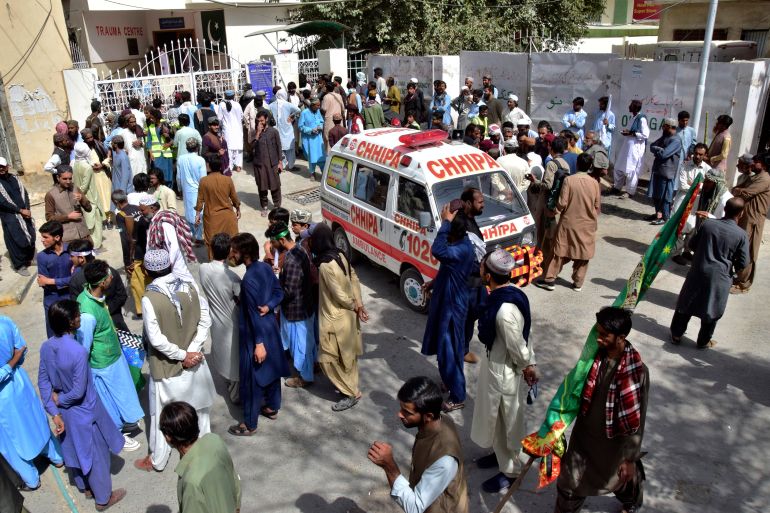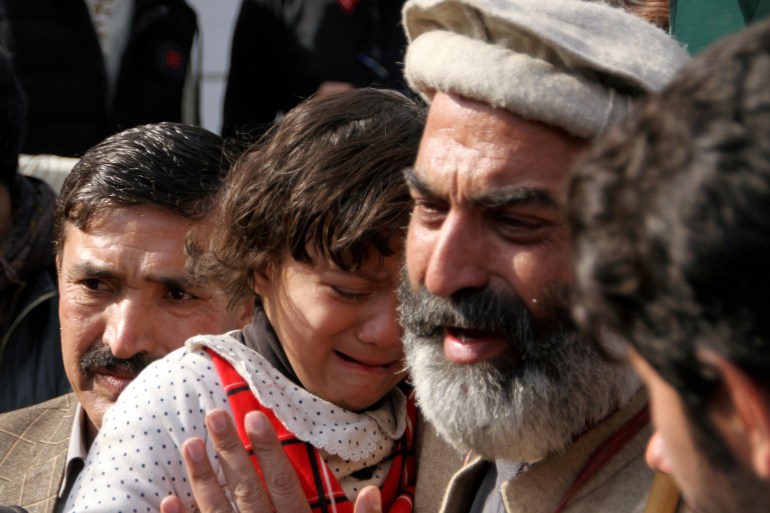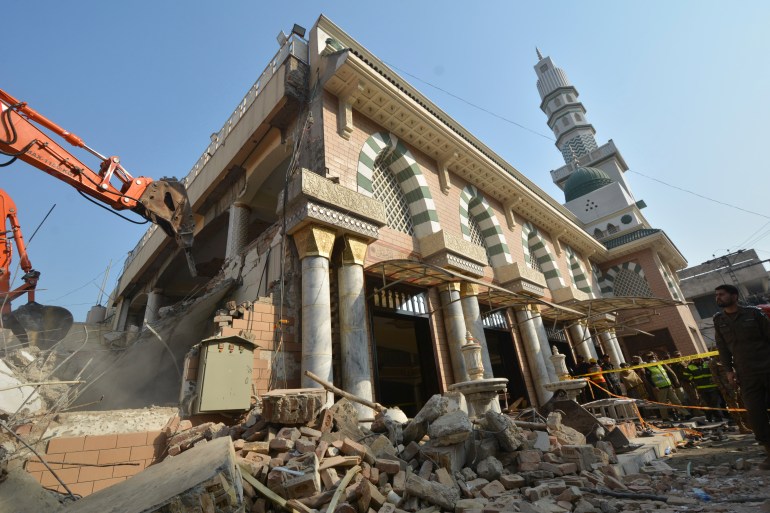What explains the dramatic rise in armed attacks in Pakistan?
Pakistan’s two border provinces have seen 93 percent rise in attacks since the TTP ended ceasefire last year.

Islamabad, Pakistan – A recent deadly suicide attack on a military post in northwest Pakistan has raised fears of the return of armed rebellion in the country’s tribal regions that have seen a dramatic rise in armed attacks this year.
A little-known group, Tehreek-e-Jihad Pakistan (TJP), claimed the December 12 bombing in Dera Ismail Khan district of Khyber Pakhtunkhwa province, which borders Afghanistan. At least 23 soldiers were killed and another 34 injured in the car bomb attack.
Keep reading
list of 4 itemsPolice and soldiers killed as more violence flares in northwest Pakistan
Pakistan extends deadline for Afghans awaiting third-country resettlement
Pakistan court indicts jailed ex-PM Imran Khan in state secrets case
The attacks by the TJP have brought back memories of the series of deadly attacks carried out by armed groups led by the Pakistan Taliban, known by the acronym TTP, in late 2000.
But why have attacks on security forces increased and how are the Pakistani government and the military planning to handle it?
What explains the surge in the attacks?
The first 11 months of the year witnessed 664 attacks of varying nature and size across the country, an increase of 67 percent from the corresponding duration in 2022, according to the Pakistan Institute for Conflict and Security Studies (PICSS), an Islamabad-based research organisation.
But the bulk of the attacks have targeted two provinces – Khyber Pakhtunkhwa in the northwest and Balochistan in the southwest.
Almost 93 percent of the total attacks took place in these two provinces, with Khyber Pakhtunkhwa the worst affected province, witnessing 416 attacks since November 2022 when the TTP walked out of the ceasefire with the government.
Pakistan Taliban’s ideology is aligned with the Taliban in Afghanistan, which currently rules the war-torn country. However, the groups have different goals and they operate independently.

In January, at least 100 people, mostly policemen, were killed in the worst attack of the year, when a suicide bomber blew himself up in a mosque in Peshawar, the capital of Khyber Pakhtunkhwa. The attack was claimed by a TTP splinter group, Jamaat-ul-Ahrar.
The genesis for the spike in the violence, analysts say, could be traced back to the unilateral decision by the Pakistan Taliban to end the ceasefire last year. The armed group has asserted that its attacks were in response to the renewed military operations in the region.
Among their main demands include the release of its members and the reversal of the merger of the tribal region with the Khyber Pakhtunkhwa province. A stricter imposition of their interpretation of Islamic laws is also one of the demands.
The Pakistani army has conducted multiple operations to eliminate the group since 2002 but struggled to achieve its goal as fighters have used the porous border to find safe haven in Afghanistan.
Since its founding in 2007, the TTP has targeted both civilians as well as law enforcement personnel, resulting in thousands of deaths. Their deadliest attack came in December 2014, when they targeted the Army Public School (APS) in Peshawar, killing more than 130 students.
The TTP also claimed responsibility for shooting Malala Yousafzai in 2012. Yousafzai went on to win the Noble Prize for Peace in 2015 and is currently a globally renowned girls’ education activist.
The most disconcerting aspect of TJP lies in its implementation of suicide attacks.
The group remains banned in Pakistan and has been designated a “terrorist” group by the United States. Formed to unify like-minded groups in the region, the TTP stepped up attacks in response to Pakistani military operations launched to flush out foreign fighters fleeing the US invasion of Afghanistan in 2001.
In response to the APS attack, the Pakistani military launched a large-scale military operation, titled Zarb-e-Azb, against the armed groups. While the Pakistani army claimed it was able to achieve its objective, the military operation was harshly criticised by the local population as well as human rights organisations.
The military was accused of adopting scorched earth tactics and carrying out enforced disappearances of individuals accused of having links with the TTP. Many of those arrested were tried in a military court, which is considered contrary to international law.
Which groups have sought to claim responsibility for the recent attacks?
With the return of the Taliban government in Afghanistan in August 2021, which has had historical links with the Pakistani security establishment, it was believed that managing the TTP would become easier.
A month after the Taliban took over Kabul, it helped facilitate the meeting between the Pakistani military with the TTP for both sides to engage in a ceasefire talk, a decision endorsed and pushed by Imran Khan, Pakistan’s then-prime minister.
Subsequently, over the next few months, a tentative ceasefire led to the release of senior TTP leaders imprisoned by Pakistan. It also facilitated the resettlement of hundreds of TTP fighters and their families back to Pakistan. Some of their leaders had been released as part of peace deals with previous Pakistani governments.
However, low-scale skirmishes between the two sides continued well into 2022, with both sides accusing each other of violating the agreement.

Despite repeated meetings, in Pakistan and Afghanistan, the growing distrust between the two sides increased. The removal of Khan as prime minister in April 2022, followed by the retirement of army chief General Qamar Javed Bajwa in November 2022, did not help the cause. The TTP announced a unilateral end to the ceasefire days after Bajwa retired.
The emergence of an obscure TJP, believed to be affiliated with the TTP, has further raised concerns among policymakers. TJP has been behind at least seven major attacks this year, including the latest one in Dera Ismail Khan.
The group targeted a Pakistani Air Force airbase in Mianwali city in November and in another attack this year in Zhob city of Balochistan it killed at least 14 army personnel.
According to researchers who study different armed groups in Pakistan and Afghanistan, TJP remains an “enigmatic organisation”.
The group, which has carried out several attacks this year, is shrouded in mystery regarding its leadership, members, and locations. The main source of information about the TJP is derived from its media releases. The group claims it was formed to “wage jihad against Pakistan with the aim of transforming the country into an Islamic state”.
Abdul Sayed, a Sweden-based researcher on armed groups in South and Central Asia, said the TTP officially recognised TJP as a fellow armed organisation in July 2023. Pakistani authorities also assert that TJP is linked to TTP.
“However, as of now, there is a lack of concrete evidence to substantiate any clandestine connections between the two groups,” Sayed told Al Jazeera.
The most disconcerting aspect of TJP, he said, lies in its implementation of suicide attacks.
“In the attacks claimed by the TJP, a group of four to seven suicide bombers conduct assaults on security force camps under the cover of darkness. This strategy has propelled the conflict between militants and security forces in Pakistan to an exceptionally destructive level,” Sayed added.
Two of the most violent attacks this year were carried out by the regional affiliate of ISIL (ISIS), the Islamic State in Khorasan Province or ISKP (ISIS-K). In July, it targeted a political rally in Bajaur, a tribal district neighbouring Afghanistan, killing more than 60 people. It was also behind a major blast in Mastung city of Balochistan in September that killed more than 50 people.
While the ISKP chose to target civilians in the few attacks it conducted, the TTP and the TJP have singled out security personnel.
Abdul Basit, a research fellow at S Rajaratnam School of International Studies in Singapore, said the tactic of targeting law enforcement personnel worked on multiple levels, as it helped demoralise the forces, as well as help create terror and air of insecurity.
Why has Pakistan been unable to control the increase in violence?
For many counterterrorism analysts and observers of the violence in the region, one of the key failings of the Pakistani government was its inability to formulate a “coherent and cogent” policy towards Afghanistan, which they believe has led to the current situation.
Elaborating on this, Basit said the Pakistani army’s strategy was based on “assumptions and hope” that after the Kabul takeover by the Taliban, it would be able to control the TTP from perpetrating its attacks in Pakistan.
Basit said fundamentally, the combination of having counterproductive Afghan policies as well as the inability to build counterterrorism capacity, the government was unable to prepare itself for the battle it is faced with now.
“Pakistan spent a lot of time seeking peace talks, but … it was not proactive in eliminating the threat. But with ceasefire ending, Pakistan is in firefighting mode,” he said.
“Now, the best they can hope for is damage limitation.”
In counterterrorism, public support is critical but in the areas which have seen long bouts of fight, such as here in Pakistan, the sentiment is hostile towards both the military as well as the rebel fighters
The peace talks Basit is referring to was endorsed by the Pakistani government under former Prime Minister Khan in late 2021, when the military engaged with the TTP. Those talks were facilitated by the Afghan Taliban. The TTP demanded the reversal of the merger of tribal districts as well as the imposition of its interpretation of Islamic law. But both demands were rejected by the then government.
The Pakistani side urged for the disbanding of the armed group, a demand which was never met.
Khan was a vocal opponent of the US-led drone strikes targeting TTP fighters in Pakistan’s tribal region bordering Afghanistan, as those attacks collaterally caused loss of civilian lives.
Basit, the Singapore-based expert, said the current situation, which sees almost daily skirmishes between Pakistani troops and TTP fighters, does not allow for any large-scale operation, for which he said the government lacks the capacity as well as the public goodwill. The researcher said the resettlement of TTP in Pakistan in early 2022 was seen as a very unpopular decision, resulting in public protests.
“In counterterrorism, public support is critical but in the areas which have seen long bouts of fight, such as here in Pakistan, the sentiment is hostile towards both the military as well as the rebel fighters,” Basit said.
Pakistan in the past has engaged in dialogue with the fighter group on numerous occasions, with at least five major peace agreements between 2007 and 2014, none of which lasted more than a few months.
The Pakistani military launched several operations in Khyber Pakhtunkhwa and tribal areas against the TTP during the same period.
With the government having tried both military operations as well as dialogues, Amina Khan, director of the Centre for Afghanistan, Middle East & Africa (CAMEA) at the Institute of Strategic Studies (ISSI) in Islamabad, concurs with Basit on the point that the government never had clarity on how it wanted to approach its policy against the TTP.
“We do not know whether Pakistan wants to engage with them in a dialogue, or to start a kinetic operation against them,” she told Al Jazeera, adding that there is a lack of agreement among stakeholders in the country on the issue.
What options does Pakistan have now?
Senior Pakistani civilian and military leaderships have conducted multiple high-level meetings with their Afghan counterparts in Islamabad and Kabul this year.
Pakistan has repeatedly alleged that Afghan soil is being used to harbour fighters, who carry out cross-border attacks, a charge the Taliban vehemently denies. After the Dera Ismail Khan attack, Zabihullah Mujahid, the spokesperson for the interim government, repeated the defence, saying there is no threat emanating from Afghan soil to any of its neighbours.
“Every incident in Pakistan should not be linked to Afghanistan. This incident [Dera Ismail Khan attack] happened hundreds of kilometres away from our country. There are security forces and intelligence there [in Pakistan], and they should be cautious about their duties,” Mujahid said last week.
In October, Pakistan decided to expel more than 1.5 million Afghans allegedly living without documents raising further tension with the Taliban administration.
Pakistani officials on numerous occasions this year also threatened to conduct cross-border attacks on TTP hideouts in Afghanistan. However, no attacks have been confirmed from either Pakistan or the Taliban government.
Sayed, the Sweden-based scholar, said the Taliban views the increasing attacks by fighters in Pakistan as an internal matter, attributing it to Pakistan’s policies resulting from its involvement in the so-called “war on terror” led by the US.
Basit, the researcher, said “choosing bravado” would be a wrong lesson from the increasing violence in the country, and waging cross-border attacks in Afghanistan would be a bad idea.
He, however, supported the idea of conducting targeted operations within Pakistan.
“You must blunt the sharp edge of the knife, first and foremost, for which you will need to use force. However, priority should be focused on internal issues and to dismantle the network of these fighters in the country. The process must be about containment, downgrading, and then eliminating,” Basit said.
However, Khan, the director at ISSI, said she was firmly of the opinion that the avenues for dialogue must remain open.
“I feel that dialogue is essential, and it must continue,” she said.